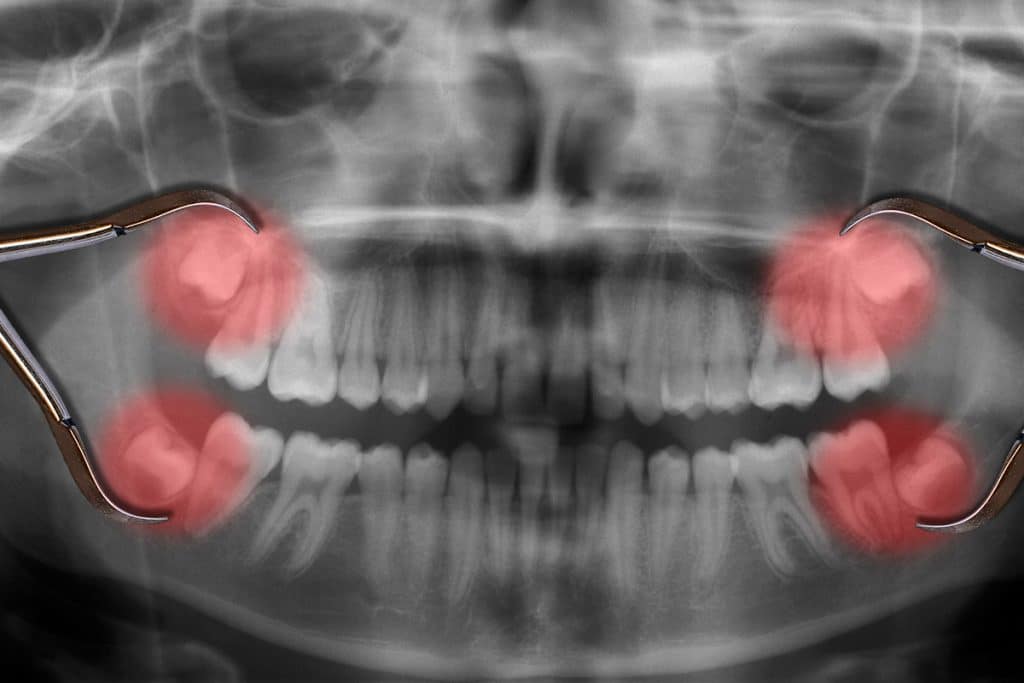What Does The Term Impacted Mean?

Impacted is a term most often associated with wisdom teeth. As you may know, the majority of people have either had their wisdom teeth removed, or will need to have their wisdom teeth removed at some point in their lives.
Wisdom teeth, the third set of molars (“third molars”) that typically develop between the ages of 17 and 25, rarely erupt into the mouth properly. As humans have evolved with smaller and smaller jaws, our mouths are no longer large enough to accommodate these large molars. Our eating habits have changed and our facial structures have changed along with them.
The result sometimes is impacted wisdom teeth. But what does the term “impacted” mean? Here’s what you need to understand when it comes to impacted wisdom teeth:
Definition of Impacted
According to Merriam-Webster, the term “impacted” means “deeply entrenched: not easily changed or removed.” When referring to impacted wisdom teeth, it means that the tooth has not moved above the level of the bone and/or gums because it has become entrapped. The wisdom tooth may become stuck under or behind another tooth or simply become settled in the jaw bone itself. If there is not enough room in the mouth for the wisdom teeth, they are more likely to encroach upon adjacent teeth and cause damage.
Do All Impacted Wisdom Teeth Need to be Extracted?
Just because wisdom teeth are impacted, doesn’t necessarily mean they need to be removed. Wisdom teeth extraction (known as odontectomy when referring to an impacted tooth) is a routine procedure when performed by an oral and maxillofacial surgeon. However, there may be times when the risk of complications related to treatment may outweigh the benefits in a particular situation. This is why all third molars should be evaluated by an oral and maxillofacial surgeon who can properly assess the best type of third molar management for you on an individual basis. Because most third molar surgery complications relate to patient age, we recommend early consultation and intervention as the best practice for everyone.
Problems Caused By Impacted Wisdom Teeth
The following problems may occur when wisdom teeth are impacted:
- Tooth decay. Impacted wisdom teeth can make it more difficult to keep your neighboring teeth clean. If the wisdom teeth are pushing against the back molars, the other teeth may become crowded together and it is more likely for plaque to gather between the teeth. Tooth decay can result in pain and infection.
- Periodontal disease. Dental crowding around wisdom teeth can cause plaque buildup on the teeth from food trapping and this can lead to gingivitis and periodontal disease (bacterial infection of the gum tissue).
- Infection. An infection can develop in the soft tissue surrounding an impacted wisdom tooth. In some cases an infection can become severe enough that it spreads to other anatomic spaces in the head, face, and neck which can be life threatening.
- Cysts. Benign fluid-filled bumps called cysts can form around impacted wisdom teeth and can become painful. Cysts can be destructive to the jaw and neighboring teeth and can become infected as well. In rare cases, cysts can undergo cystic degeneration and become malignant cancer.
- Damage to adjacent teeth. Impacted wisdom teeth can push against the adjacent molars and their roots, causing damage to the teeth and their support structures.
- Damage to the jaw bone. Wisdom teeth that are stuck below the gums may cause damage to the jaw bone, particularly where cysts or periodontal defects can form. Wisdom teeth can cause a weak point in the jaw making the jaw more prone to fracture.
Erupted Wisdom Teeth Can Also Cause Problems
In some cases the wisdom teeth erupt through the gums. They may erupt fully, but more often than not, they are malpositioned or crowded against the back of the jaw due to lack of space. Erupted wisdom tooth crowding can cause pressure against adjacent teeth and cause damage or shift the rest of the teeth out of alignment. But the most common issue relates to impaired hygiene that results in periodontal disease and periodontal related infections.
Schedule a Wisdom Teeth Consultation
If your wisdom teeth have recently come in, or if you are between the ages of 17 and 25 and have not had your wisdom teeth evaluated, it may be time for a consultation. Your dentist should refer you to an oral and maxillofacial surgeon to review management options. Dr. Lucca and his talented team at Lucca Oral & Facial Surgery can assist you and discuss a strategy customized for you regarding your wisdom teeth and anesthesia needs.
Call 617-300-0345 or contact us today to learn more and schedule an appointment.
Frequently Asked Questions About Wisdom Teeth Extraction
What is the best age to have your wisdom teeth removed?
If your wisdom teeth are causing problems or are projected to cause problems, it is best to have them removed sometime in your late teenage years or early twenties. Waiting until you are older can make the process of removal more complicated and recovery becomes more extended and difficult with increased age.
Why do I need an oral surgeon for wisdom teeth extraction?
For wisdom teeth, especially impacted wisdom teeth, the surgical process can be complex and often there are anesthesia needs. Oral and Maxillofacial Surgeons receive training unmatched in dentistry with respect to third molar management and administration of safe in-office anesthesia. Surgery will be faster and less complicated in the hands of a properly trained oral and maxillofacial surgeon. Your health care should not be advised on shortcuts to accept third molar surgery from any professional other than an oral and maxillofacial surgeon.






